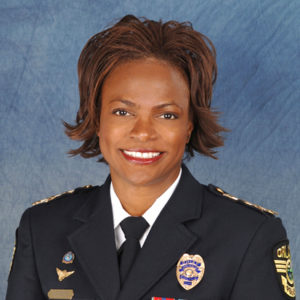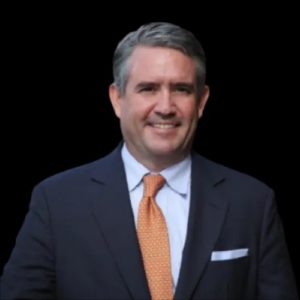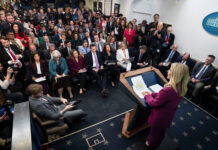A controversial new ad by underdog Republican Senator Marco Rubio of Florida has raised ethical questions about using active Florida sheriffs to endorse a candidate running for office.
The ad gained attention because they challenge Rubio’s Democratic Party opponent, U.S. Representative Val Demings, as failing to support law enforcement, even though Demings was a former police chief in Orlando, Florida, and has spent 27 years with the Orlando Police Department, where she worked her way up the ranks to become the city’s first female police chief eventually.
The 30-second ad, running on FOX, relies on sharp criticisms of Demings from four cops in full uniform who attack the former police chief as being soft on crime, pushing for more police accountability, and promoting the “defund the police” proposal.

However, while ad hominem political attack ads in any close political race are not new, they raise professional ethics questions about the role of active cops endorsing a candidate, especially when they come from conservative Republican Marco Rubio.
Rubio, who has mimicked ex-president Donald Trump’s positions on immigration, building a border wall, eliminating Social Security, anti-gay legislation, law enforcement, civil rights, and limiting voter access, is in a tight battle with Demings to be the new U.S. Senator from Florida.
Rubio’s Cop Endorsements Create Ethical Problems
Some of the cops who appeared in the FOX ad were: Brevard County Sheriff Wayne Ivey, Steve Zona, president of the Florida chapter of the Fraternal Order of Police, Marion County Sheriff Billy Woods, and Bradford County Sheriff Gordon Smith.
All the cops in the TV ad decried Demings’ positions on holding police accountable for misuse of their authority, excessive force, and re-defining the policy of qualified immunity, that protects cops against lawsuits over excessive force or unprofessional acts they do in their official capacities. In short, the cops in the ads objected to making police accountable to the communities they serve.
The TV ad is also notable for some of the comments made by the cops in the ads. For example, Bradford County Sheriff Gordon Smith said Demings sold “out to liberals, turning our back on law enforcement.” The cops also said Demings supports “radicals” who want to interfere with law enforcement. The message here is that liberals are not supportive of law enforcement.
While the 2022 Florida statutes (Title 4, Chapter 104) regarding elections and electors allow active cops to engage in “the political activity in a general, special, primary, bond, referendum, or other election of any kind or nature, of elected officials or candidates for public office in the state or any county or municipality,” it is not clear about allowing political activity in state and national elections.
“An employee may not use his official position, including information learned by virtue of his position, for his personal benefit or for the benefit of others.”
“An employee may not use his public office for his own private gain or for that of persons or organizations with which he is associated personally. An employee’s position or title should not be used to coerce; endorse any product, service, or enterprise; or give the appearance of governmental sanction. An employee may use his official title and stationery only in response to a request for a reference or recommendation for someone he has dealt with in Federal employment or someone he is recommending for Federal employment.”
“Law enforcement officers, individually, do not have the same first amendment rights as private industry employees”
In a 2019 Jacksonville, Florida case involving uniformed cops who endorsed a mayoral candidate, Jacksonville’s Office of General Counsel said no city ethics rules were violated, claiming there’s nothing on the books prohibiting off-duty, uniformed officers from participating in political ads, according to a report in First Coast News.
However, the general counsel of the National Fraternal Order of Police claimed the endorsements were a violation of Hatch Act guidelines that say officers are allowed to endorse or oppose a partisan political candidate in an ad or broadcast, “so long as the officer is not on duty and not wearing a uniform, badge or insignia.”
The Hatch Act (passed in 1939) limits the political activities of federal employees, employees of the District of Columbia government, and certain employees of state and local governments. The Act has a wide reach since it covers law enforcement and other civil servants working in agencies that are who get federal money from using their “official authority” to influence elections.
But in Florida, sheriffs get a pass because of a special carve-out in the Hatch Act that does not apply to cops, firefighters, military, and even animal control officers of lesser rank.
But as this 2016 article in Florida Today states: “the sheriff, as an elected partisan officeholder, is not an “employee,” says a 2012 opinion by the U.S. Office of Special Counsel. He falls into a small class of exempt officials that includes the president and vice president of the United States.” While the sheriffs can appear in the ad, ethics regulations prevent them from campaigning, endorsing candidates, or participating in political demonstrations, while on duty or in uniform. The question is: Were the sheriffs on duty when they made the Rubio ads?
While Florida has a liberal interpretation of this practice, cops in other states have gone to jail for getting political. In California, Los Angeles County Sheriff Lee Baca admitted in 2012 that he broke state law by making a political endorsement while in uniform. Baca said he knew he was breaking state law after the Los Angeles Times found a campaign video on the website for a candidate for LA district attorney. In the video, Baca was wearing his badge and his sheriff’s uniform. In the Marco Rubio TV ads, all the Florida sheriffs are in uniform.
Cop endorsements are controversial. In the past, police unions endorsed candidates and this remains the accepted form of political engagement. For instance, New York State Troopers Police Benevolent Association and the New York City’s Police Benevolent Association both made historic endorsements of Donald Trump in his 2020 re-election campaign. But using individual cops in uniform is not widely accepted.
Cops in March Rubio’s Political Ads Are “A Dangerous Precedent”
But the legal, constitutional, and ethical issues about using uniformed cops in political ads are a big problem, according to some experts.

“Law enforcement officials, as US citizens, have the right to support a political candidate. However, it’s unethical for them to show their support while wearing their uniforms and using their formal titles,” according to Colleen A. Clark, an attorney with Schmidt and Clark, in Washington DC.
Mr. Clark continued that “the fact is that law enforcement officials, especially the police, have taken an oath that requires them to serve without fear or favor. Police officers can’t adequately serve people if they get involved in politics. When a law enforcement official openly criticizes a candidate for their political beliefs (regardless of what they are), it raises a red flag to the community.
“Other than it intimidates voters and produces undemocratic outcomes, the essence of impartiality of law enforcement will be lost. People are not supposed to fear law enforcement going after them on the orders of the government.”

A Constitutional expert also noted that there is a fundamental problem with police, soldiers, or other government workers making any political statement whilst wearing a uniform,” Demings TV ads according to Edward Davey, Chief Editor, ConstitutionUS.com, a leading U.S. Constitution website.
When cops attack a candidate for being “too liberal,” as they do in the Rubio ads, it raises issues about potential police-state tactics and how prejudiced views are applied in daily police work. For instance, how does a cop discern whether a person is “liberal,” gay, or of a certain religion, or if that even has a bearing on the problem being addressed?
Some of the problems Mr. Davey referred to happen when uniformed cops or military personnel work, and the ad makes them appear politically motivated and not seen as representing their respective organizations.
“This causes confusion amongst the public, as suddenly they may think that the whole police force, for example, holds a certain view. This is as opposed to when an official is out of uniform and just representing their own point of view; first as a citizen, and then as a father, policeman, etc.”
Why Did Rubio Need Cop Endorsements?
Another significant problem, Mr. Davey said, is that law enforcement officials need to work through successive governments and different political parties. “One way that they can do this is to try and keep politically neutral on issues that don’t directly affect their jobs,” he said.
“So, whereas it would be okay to campaign for an increase in public funds for their organization, campaigning for other issues (e.g. abortion) which aren’t directly relevant to their role, starts a dangerous precedent
”Whether wearing a uniform or being quoted using their official title, the issues are similar in terms of who they actually represent.
Unfortunately, today’s society is very sensitive to the government’s power when controlling citizens’ lives and specifically the open use of excessive physical force.
“When criticizing a candidate’s views as being too liberal on a policy that is related to carrying out an official’s job, this can be seen as a sudden move in the direction of a police-state where the government may not be adequately protected by checks and balances or the rule of law. Both of which a democratic state depends on.”
Rick Musson, a 20-year law enforcement officer, and consultant with Clearsurance.com, also cautioned that individual cops in uniform who endorse political candidates can alienate the public and can endanger the police force.
While Mr. Musson said law enforcement unions and associations “routinely endorse candidates. Often, these groups are non-partisan and endorse the candidate whose views and commitments align with what will help their group best.
“And while not everyone in a group will agree with the endorsement, the public doesn’t know each personal officer’s affiliation. The lack of individual endorsement protects the officers when they deal with people who may have great differences of opinion.”
But when individual cops in uniform make political endorsements, that dynamic changes. “Stepping outside the group and endorsing a candidate as an individual removes that protection. There’s rarely a good reason to alienate half of the members of the public that you serve. Enforcing the law should not be political, but publicly announcing a political stand puts an officer in the political arena and leaves them open to scrutiny,” Musson said.
Cops Don’t Have the Same First Amendment Rights as Ordinary Citizens
There is also a significant perception problem with the general public and the critical audience cops work with daily. “As a public relations professional that has worked in law enforcement most of my career, I have always cautioned officers to NOT DO IT, but let their police associations voice their opinion,” according to Stacey Dillon, a PR professional in Salt Lake City, Utah.
“Law enforcement officers, individually, do not have the same first amendment rights as private industry employees. Endorsements, unless you are a union president or an administrator (that has been given permission from their municipality) are the only people in law enforcement that can voice their support or opposition. Otherwise, officers can be investigated administratively and disciplined or even fired for voicing their support, even if they did it on their own time. There are many case laws surrounding this topic.”

Ms. Dillon also cautioned officers that “political discussions that happen within the closed doors of an association stay that way, with rank and file. This allows the president of the association, and the only one constitutionally protected, to make the endorsement.
“With the associations that I worked with, I kept reinforcing to officers that no matter how much they thought their social media accounts were locked down, especially if they had any online activity, while they were working, they were still subject to discipline for voicing their political opinions,” according to Ms. Dillon.











